So in lieu of having a life, I’ve been rereading the Iliad at an embarrassingly glacial pace.
Revisiting the classics as an adult is interesting because you pick up on subtleties you never noticed as a teen.
One thing that stood out to me was how Homer’s characters, though tragically and irresistibly flawed in many ways, to their credit never seem to resent privilege, excellence or greatness.
You are devastatingly handsome, impossibly athletic or dangerously cunning through no fault of your own? You descend from a long line of great heroes and famed beauties? Ah, then you must be one of the gods’ favourites, and will be revered, admired and feared as such.
Today we still value accomplishment, of course, but it’s only really valued if it’s the fruit of grit and hard work rather than the circumstances of one’s birth or environment.
The trouble is, true grit seems hard to find these days. We post-moderns love to nitpick success and are quick to chalk it up to winning the genetic lottery, or being born with a silver spoon in one’s mouth, or having a personality disorder, or being in the right place at the right time, or having a robust support system, or knowing the right people. As if there’s anyone out there who’s done well for themselves and is also a clean slate with no genetics and no other unfair advantage in life — as if true merit even exists.
We pretend we do all this analysing to understand and hopefully replicate success, but, really, if we’re honest with ourselves, it’s to explain it away. (Me? Guilty as charged.)
You’ll see none of that in the Iliad. The Achaeans and the Trojans don’t think in the dry soulless categories of genetics, path dependence, temperamental predispositions, socioeconomic class, generational wealth, bull markets and underdeveloped amygdalas.
They think in terms of noble lineage, of divine favour, of the Three Fates, of kairos — the fleeting opportune moment, the right time to strike — a concept of time juxtaposed to chronos or chronological time. They think in poetry, not data.

Blood runs thick
Lineage, in particular, is a big deal in the Iliad and not something to resent or apologise for. It is a matter of utmost honour to kill or be killed by a member of a great house, and warriors will actually pause mid-battle to inform opponents of their genealogy, of their vast estates back home and of the legendary deeds of their forefathers.
In Book VI of the poem, two great heroes face each other on the battlefield: the formidable Diomedes, son of Tydeus and darling of Athena, and Glaucus, a Lycian leader and Trojan ally. Diomedes is impressed and asks who Glaucus is, and incidentally delivers one of the most badass lines in all Graeco-Roman Antiquity (in bold):1
[F]irst to speak was Diomedes of the great war cry:‘Who among mortal men are you, good friend? Since neverbefore have I seen you in the fighting where men win glory,yet now you have come striding far out in front of all othersin your great heart, who have dared stand up to my spear far-shadowing.Yet unhappy are those whose sons match warcraft against me. […]’
Glaucus is unfazed and proceeds to give two pages’ worth of a lecture on his ancestors, which include the legendary Bellerophon, slayer of the fire-breathing Chimaera. He ends the speech with his father’s explicit instructions:2
Then in turn the shining son of Hippolochos answered:‘High-hearted son of Tydeus, why ask of my generation?…[...] Hippolochos begot me, and I claim that he is my father;he sent me to Troy, and urged upon me repeated injunctions,to be always among the bravest, and hold my head above others,not shaming the generation of my fathers, who werethe greatest men in Ephyre and again in wide Lykia.Such is my generation and the blood I claim to be born from.’
Quick philosophical aside: Note that the injunction is to not shame the generation of your fathers, rather than to make them proud. This is a great example of via negativa or the way of negation, a method of describing something or arriving at truth by stating what it is not rather than what it is. Most commonly associated with theology and describing the nature of God, via negativa is also used more broadly when grappling with unknown, uncertain or ‘fuzzy’ concepts.
Homer knew this, too — maybe not consciously but in his bones for sure. It’s hard to say what would make your forefathers proud, exactly, but it’s pretty damn clear what would embarrass them.
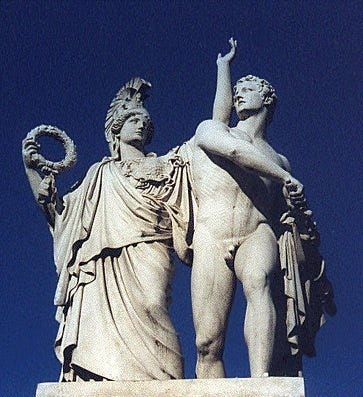
Noblesse oblige
Anyway, let’s get back on topic. In addition to via negativa, Homer was aware of the concept of noblesse oblige. Great privilege entails great responsibility well beyond making a name for yourself and not shaming your fathers. In Book XII, Sarpedon, who’s got an impossibly cool name, tells his cousin Glaucus it is their duty to fight in the forefront:3
‘Glaukos, why is it you and I are honoured before otherswith pride of place, the choice meats and the filled wine cupsin Lykia, and all men look on us as if we were immortals,and we are appointed a great piece of land by the banks of Xanthos,good land, orchard and vineyard, and ploughland for the planting ofwheat?Therefore it is our duty in the forefront of the Lykiansto take our stand, and bear our part of the blazing of battle,so that a man of the close-armoured Lykians may say of us:“Indeed, these are no ignoble men who are lords of Lykia,these kings of ours, who feed upon the fat sheep appointedand drink the exquisite sweet wine, since indeed there is strengthof valour in them, since they fight in the forefront of the Lykians.” […]’
Here we see that noble lineage and the gifts and favour of gods are something to be ashamed of only when misused; when you refuse to pay your dues and forget that the greater the privilege, the greater the duty to your ancestors and your community.
The sins of fathers
Homer also makes it clear that illustrious lineage cuts both ways, for one dwells among gods and kings at one’s peril.
There is an ominous undercurrent of familial doom in the Iliad. The house of Agamemnon and Menelaus — the House of Atreus — was twice-cursed by the gods. With good reason, to be fair.
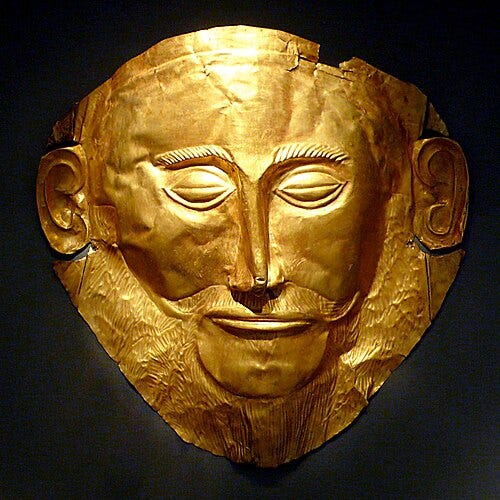
The house’s founder and son of Zeus, Tantalus, slaughtered his son Pelops and fed him to the Olympians to test their omniscience. Most knew right away what had happened, but Demeter, grief-stricken by the abduction of her daughter Persephone by Hades, unwittingly ate the boy’s shoulder. As punishment, the gods cursed Tantalus’s bloodline and threw him into the underworld, where he’d spend eternity standing in a pool of water under a fruit tree. Whenever he reached for the fruit, the branches would rise out of grasp. Whenever he bent down to drink, the water would recede. Hence: tantalising.
The gods revived Pelops, who later married the princess Hippodamia after beating her father at chariot racing. To ensure his victory, Pelops sabotaged his opponent’s chariot with the help of the royal servant Myrtilus. This tragically resulted in the king’s death. Pelops then killed Myrtilus — either because he tried to rape Hippodamia; or because Pelops had promised him the right to take her virginity but went back on his word; or because Pelops didn’t want to share credit for the victory. At any rate, the dying Myrtilus cursed Pelops and his line.
The double curse brought about endless misfortune. Pelops and Hippodamia’s sons, Atreus and Thyestes, murdered their half-brother and were exiled to Mycenae with their mother, who hanged herself.
Atreus became king of Mycenae; Thyestes started an affair with his brother’s wife and usurped the throne. You’d think this family would keep a low profile after the whole cannibalism fiasco, but no: They did it again. After taking his throne back, Atreus killed Thyestes’s sons and fed them to him. Thyestes was exiled again, this time for eating human flesh. An oracle advised him to have a son with his own daughter (yikes), which Thyestes promptly did, as the boy, Aegisthus, was destined to kill Atreus. Aegisthus eventually killed his uncle, but not before Atreus had fathered Agamemnon and Menelaus.
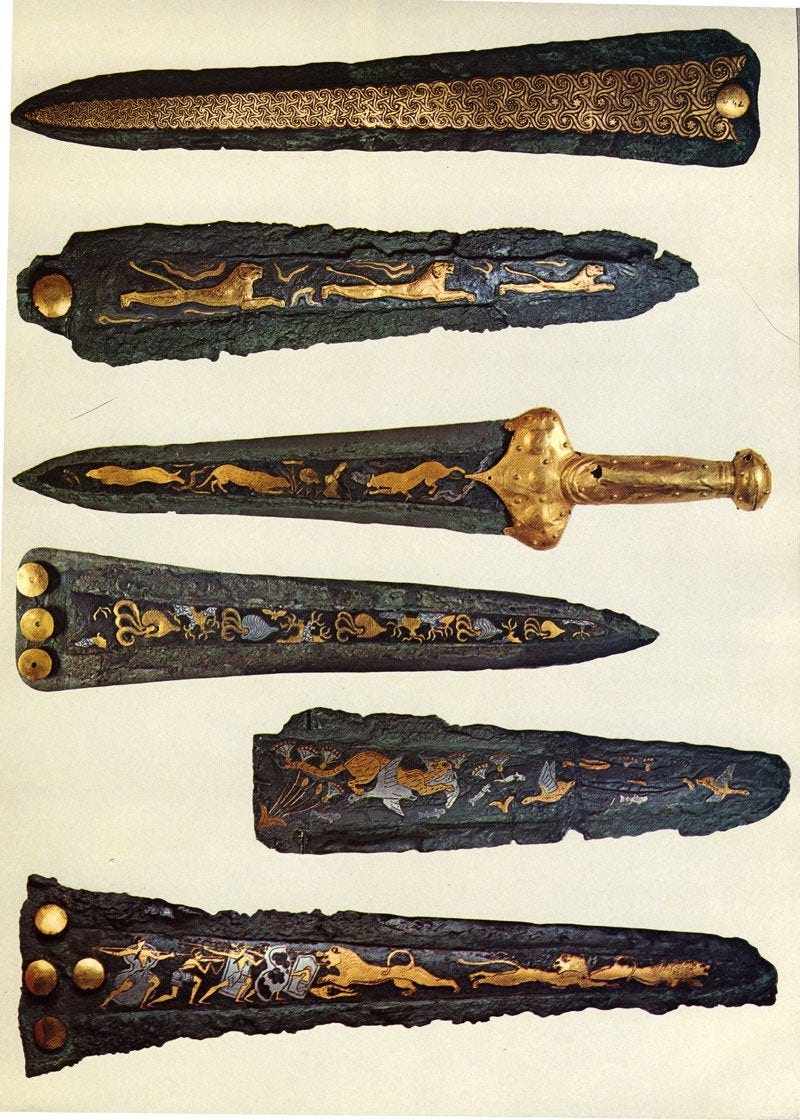
Agamemnon is an undisputed c*nt in the Iliad. Yet in the grand scheme of things, he is a tragic and almost likeable character who took on the brunt of the generational curse so that his brother could have Helen back and live happily ever after. Agamemnon launched a thousand ships, sacrificed his daughter Iphigenia and waged and won a ten-year war, only to lose everything and die an ignominious, painful death — totally deserved, by the way — at the hands of his wife Clytemnestra and her lover Aegisthus. In the end, Agamemnon’s son Orestes avenged him by killing his mother and uncle, and thus, by some unfathomable Greek logic, broke the familial curse.
None of this is in the Iliad, but ancient audiences would have been very familiar with the greater Trojan cycle and the dark curse looming over the Atreides. Ultimately, it’s pointless to resent noble descent, for heritage is a package deal; you take the good with the bad.
What’s in a name?
For all their reverence for inherited privilege, Homer’s characters aren’t blinded by it and do value hard work and individual accomplishment.
Your family name will only take you so far. The Achaean warlords respect Agamemnon as a king but judge him by his deeds and martial prowess — and judge him a great man, all things considered. Well, except for Achilles, who thinks Agamemnon a ‘wine sack, with a dog’s eyes’ and ‘a deer’s heart’,4 ‘wrapped in shamelessness’.5 LOL.
Likewise, King Priam of Troy had a whopping 68 sons, but history only remembers Hector — and Paris, but he is remembered as a fool, a womaniser and a coward of mythological proportions, literally. Priam himself cries out to his surviving sons after Hector is killed:6
‘[…] wicked children, my disgraces. I wish all of youhad been killed beside the running ships in the place of Hektor.Ah me, for my evil destiny. I have had the noblestof sons in Troy, but I say not one of them is left to me,Mestor like a god and Troilos whose delight was in horses,and Hektor, who was a god among men […][…] All theseAres has killed, and all that are left me are the disgraces,the liars and the dancers, champions of the chorus, the plunderersof their own people […]’
Overall, the Iliad makes it plain that Athena may steady your hand and guide your spear, but you must still show up for battle and throw it yourself. Oh, and be sure to fight in the thick of it. The Olympians never seem to take an interest in those on the periphery.
Dangerous beauty
The gods give with one hand and take with the other, and an exceptional gift commands an exceptional price, which is why no one other than herself seems to fault Helen for her part in the events. Such great beauty is the mark of the immortals, surely, and must have been fated to bring on great calamity.
In Book III, King Priam and the Trojan elders sit on the ramparts overlooking the battlefield as Paris and Menelaus are about to engage in single combat. As Helen approaches the tower, the old chieftains ‘murmur softly to each other’:7
‘Surely there is no blame on Trojans and strong-greaved Achaiansif for long time they suffer hardship for a woman like this one.Terrible is the likeness of her face to immortal goddesses. […]’
Priam calls out to Helen — ‘dear child’ — and invites her to sit beside him — ‘I am not blaming you: to me the gods are blameworthy’.8
Love thy enemy
Priam then asks Helen to tell him who’s who in the Achaean ranks. The old man doesn’t hold back his praise: Ajax, he says, is ‘a man of power and stature’.9 What about Agamemnon? Priam has ‘never yet looked on a man so splendid nor so lordly’;10 he is indeed ‘blessed, child of fortune and favour’.11
When they get to Odysseus, the councillor Antenor interjects and recounts the time he met with him and Menelaus some ten years ago, at the start of the war. Menelaus spoke ‘in few words but exceedingly lucid,’12 Antenor remembers, ‘since he was no long speaker nor one who wasted his words though he was only a young man.’13 As for Odysseus:14
‘[…] But when that other drove to his feet, resourceful Odysseus,he would just stand and stare down, eyes fixed on the ground beneath him,nor would he gesture with the staff backward and forward, but hold itclutched hard in front of him, like any man who knows nothing.Yes, you would call him a sullen man, and a fool likewise.But when he let the great voice go from his chest, and the words camedrifting down like the winter snows, then no other mortalman beside could stand up against Odysseus. […]’
Talk about generosity of spirit, eh? Not only do the Trojan elders bear no ill will against their enemies, but they genuinely respect and admire them, giving credit where credit is due.
And why shouldn’t they? The war’s already upon them; what use is to hate and resent, to assign blame and point fingers? Now’s the time to protect their city and let warriors on both sides seek glory on the battlefield.
Later, in Book XXIV, two characters take magnanimity to the limits of the humanly possible. Priam, the grieving father, has just undertaken a perilous journey under cover of night to beg for the return of Hector’s body. After the old king and Achilles come to an agreement, they spend most of the night eating, drinking and talking in Achilles’s tent:15
Priam, son of Dardanos, gazed upon Achilleus, wonderingat his size and beauty, for he seemed like an outright visionof gods. Achilleus in turn gazed on Dardanian Priamand wondered, as he saw his brave looks and listened to him talking.
But don’t let the sportsmanship fool you: In no way, shape or form is war presented as remotely good or desirable. Throughout the Iliad, there’s no doubt that war is a heart-wrenching tragedy for all involved and best avoided.
And try to avoid it they do. At the start of the war, the Achaeans send a diplomatic mission offering peace in return for Helen and the stolen treasures, but Paris turns them away. Then there are two duels — one between Paris and Menelaus, and one between Hector and Ajax — that are supposed to determine the outcome of the entire war. Both duels are thwarted by gods who want to see Troy destroyed, for such is its Fate.
It seems to me the message isn’t that war is to be taken lightly but that if war — or tragedy, or strife, or hardship — is our lot, then we better get on with it. Whatever our gifts, whatever our destiny, we must take ownership, pay the gods’ dues and look them in the eye.
In the words of Hector, who debates, moments before his death, whether to seek cover inside the city or bargain with Achilles but promptly judges the former ignoble and the latter pointless:16
Better to bring on the fight with him as soon as it may be.We shall see to which one the Olympian grants the glory.

The choice is yours
The quote above implies that Hector had a choice, and choice implies personal agency and free will. These, somehow, are not entirely at odds with Fate, with the gods’ gifts and divine intervention in the world of the Iliad.
Hector also repeatedly blames and lashes out at Paris, which implies that he, too, had a choice. This diatribe is long but just too good not to include:17
‘Evil Paris, beautiful, woman-crazy, cajoling,better had you never been born, or killed unwedded.…[…] there is no strength in your heart, no courage.Were you like this that time when in sea-wandering vesselsassembling oarsmen to help you you sailed over the water,and mixed with the outlanders, and carried away a fair womanfrom a remote land, whose lord’s kin were spearmen and fighters,to your father a big sorrow, and your city, and all your people,to yourself a thing shameful but bringing joy to the enemy?And now you would not stand up against warlike Menelaos?Thus you would learn of the man whose blossoming wife you have taken.The lyre would not help you then, nor the favours of Aphrodite,nor your locks, when you rolled in the dust, nor all your beauty.No, but the Trojans are cowards in truth, else long before thisyou had worn a mantle of flying stones for the wrong you did us.’
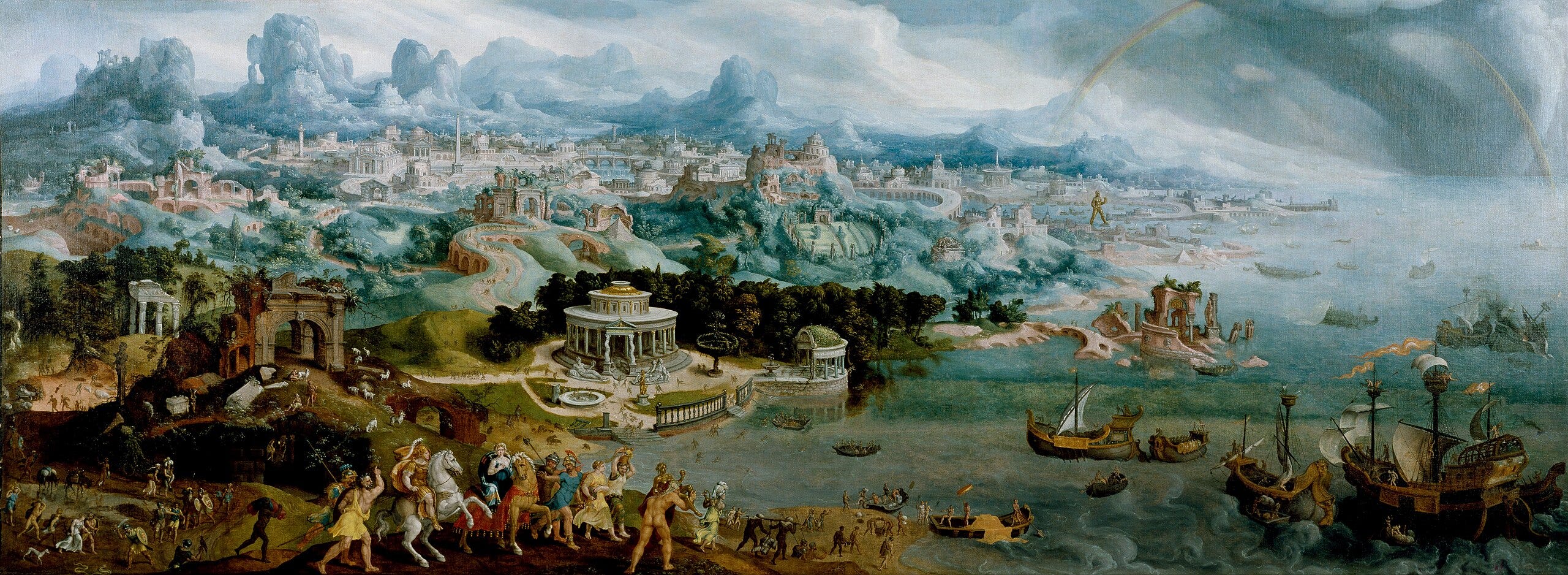
Of course, the foremost choice in the Iliad, the decision that sets the unstoppable wheels of Fate in motion, is that of Achilles.
His mother, the sea goddess Thetis, had told him long ago of his alternate fates: either die young at the gates of Troy and win eternal glory, or return home and die content and full of days — a prosperous but unremarkable life.
As a young man, he’d chosen the first option, partly due to Odysseus’s trickery but also lured by the promise of fame, adventure and riches — but perhaps most of all driven by the impulse of the boy to prove himself in a world of men.
But after nine years of what seems to him increasingly pointless bloodshed, Achilles has matured and grown wiser and weary. He’s fought at the gates of Troy. He’s sacked twelve cities by sea and eleven by land, bringing back untold treasures to Agamemnon, who, ‘waiting back beside the swift ships, would take them, and distribute them little by little, and keep many’.18 He begins to suspect they are fighting not so much for Menelaus’s honour as for his brother’s gain.
Achilles is now ‘unwilling to fight against brilliant Hektor’19 and on the verge of choosing the quiet life:20
I for my part did not come here for the sake of the Trojanspearmen to fight against them, since to me they have done nothing.
On the eve of Patroclus’s death, Achilles prepares to load his ships and sail back to his aged father and his homeland, where he plans to marry ‘the bride of [his] fancy’21 and rule the realm. ‘For not worth the value of my life are all the possessions,’22 he says. Riches can be lost and won, ‘but a man’s life cannot come back again.’23
But as the poet would have it, Fate strikes — three times. In quick succession, Achilles loses Briseis to Agamemnon and Patroclus and another close friend, Antilochus, to Hades. Each time Achilles goes mad with wrath and grief and makes fatal decisions.
And yet he always has a choice, even in his final moments. Blind with rage, Achilles attacks Apollo, the divine defender of the Trojans, before the city gates (according to some sources). Apollo warns him to back off, three times. It is only after Achilles attacks a fourth time that the god guides Paris’s arrow to the eponymous heel.
Now don’t come at me with some Marxist rebuttal. This post, while admittedly much too long and not particularly cohesive, isn’t a defence of the Rothschilds, Putins and Al Capones of this world. It isn’t about politics, social hierarchies, power imbalances, white privilege, inequality, or — one shudders at the thought — the economy. And neither is it about psychology, or history, or war, even.
Homer’s heroes inhabit the realm of Poetry and Myth. Poetry and Myth deal in symbols, not statistics and don’t concern themselves with society and its pseudo-sciences, with the dreary macro level where everything gets diluted, homogenised and averaged to the point of offering no insight to the individual. The supreme concern of Poetry and Myth is the individual psyche. They offer a map for your hero’s journey, your twelve labours, not those of humanity at large.
The Iliad, I reckon, suggests a fresh and perhaps more useful lens through which we as individuals can view privilege and accomplishment: with largesse. For all we know there is no rhyme or reason to the gods’ favour. It is both random and fickle, so why waste our precious time pondering the schemes of the Olympians or resenting their darlings?
If you’re born in the time of Achilles and Hector, marvel at them, for they are a sight to behold. Don’t envy or belittle their glory, don’t nitpick for flaws too much and certainly don’t analyse ad nauseam. Awe, like Eros, demands mystery.
As for your divine gifts, big or small, make use of them. Use them wisely if you can, unwisely if you must, but for the love of Zeus: Use them.
To quote Menelaus, who’s actually a pretty decent guy as far as warlords go and has become one of my favourite characters in the Iliad, ‘above us the threads of victory are held in the hands of the immortals.’24 He says this as he volunteers to meet Hector — Hector the breaker of horses, the beloved of Zeus, a god among men — in single combat when not one out of nearly one hundred and fifty thousand Achaeans dares to. Menelaus knows there is no shame in losing. What’s shameful is refusing to try.
And if you try, who knows, you might find — indeed this is the only way to find out — that you, too, are a child of Fortune and Favour. As the great Greek poet Constantine Cavafy wrote:25
Because we smashed their statues to pieces,because we chased them from their temples —this hardly means the gods have died.
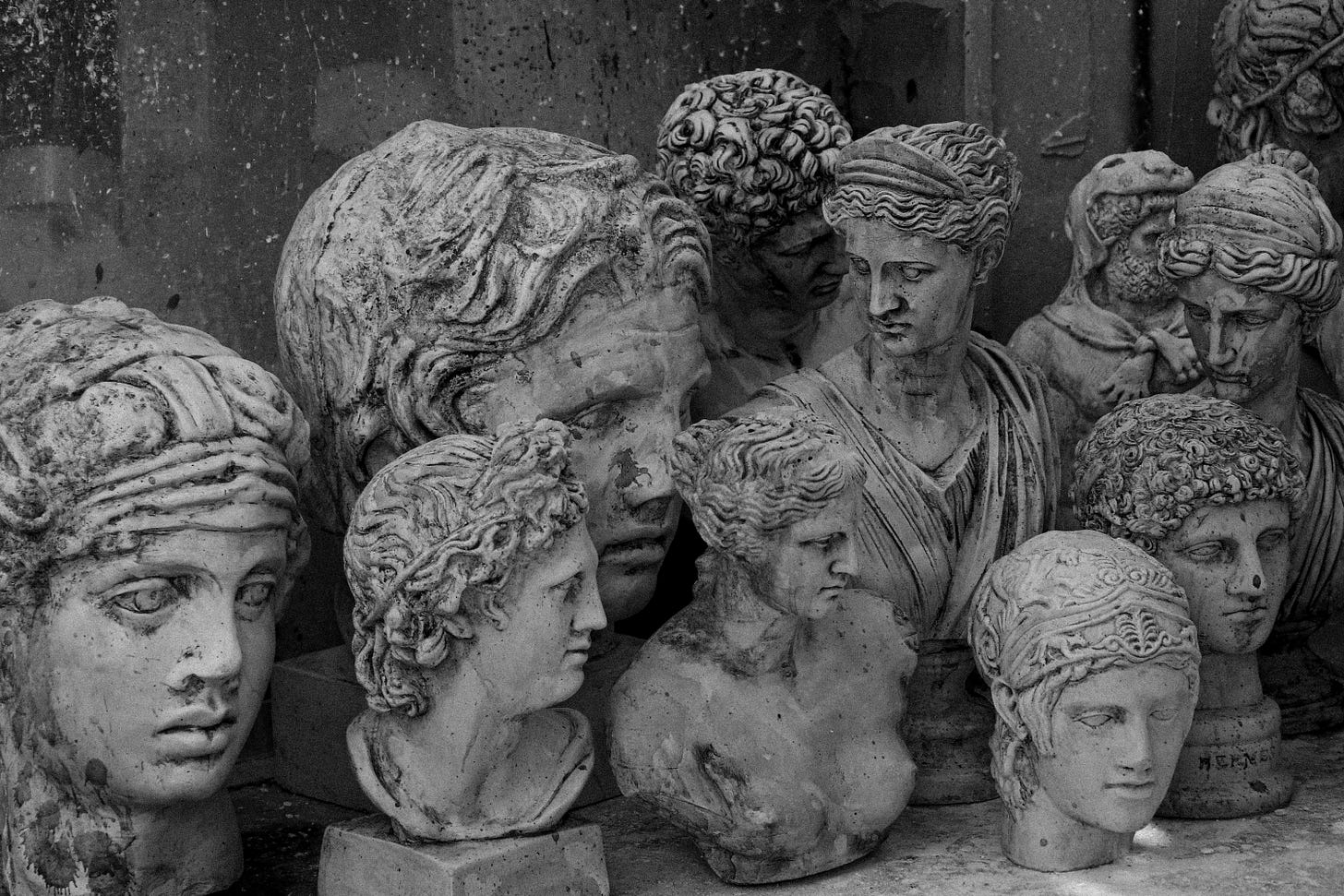
Homer. (1953). The Iliad of Homer (R. Lattimore, Trans.). University of Chicago Press. (Original work published ca. 800 BC). Book 6. Verses 122-27.
Homer. (1953). Book 6. Verses 144-45; 206-11.
Homer. (1953). Book 12. Verses 310-21.
Homer. (1953). Book 1. Verse 225.
Homer. (1953). Book 1. Verse 149.
Homer. (1953). Book 24. Verses 253-62.
Homer. (1953). Book 3. Verses 155-58.
Homer. (1953). Book 3. Verses 162; 164.
Homer. (1953). Book 3. Verse 226.
Homer. (1953). Book 3. Verses 169-70.
Homer. (1953). Book 3. Verse 182.
Homer. (1953). Book 3. Verses 213-14.
Homer. (1953). Book 3. Verses 214-15.
Homer. (1953). Book 3. Verses 216-23.
Homer. (1953). Book 24. Verses 629-32.
Homer. (1953). Book 22. Verses 129-30.
Homer. (1953). Book 3. Verses 39-40; 45-57.
Homer. (1953). Book 9. Verses 332-33.
Homer. (1953). Book 9. Verse 356.
Homer. (1953). Book 1. Verses 152-53.
Homer. (1953). Book 9. Verse 399.
Homer. (1953). Book 9. Verses 400-01.
Homer. (1953). Book 9. Verse 408.
Homer. (1953). Book 7. Verses 102-03.
Cavafy, C. P., & Mendelsohn, D. (2014). Songs of Ionia. In Cavafy Poems (Ser. Everyman’s Library Pocket Poets). Everyman.




